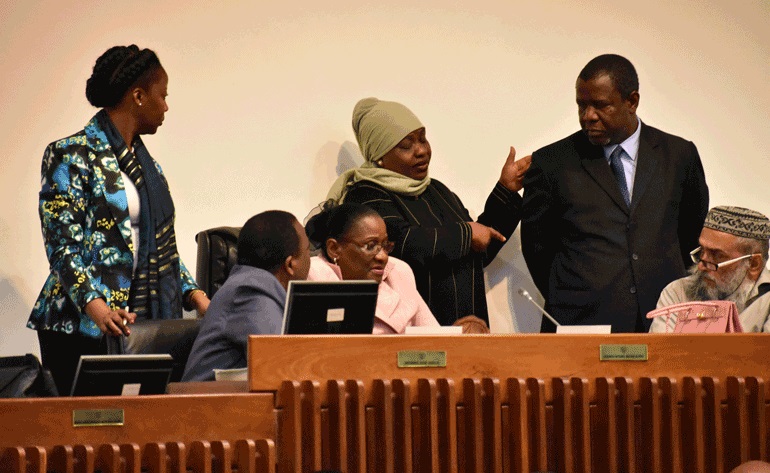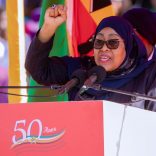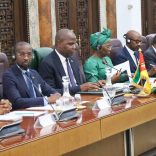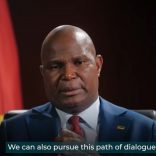Mozambique: President wants residents in Sofala out of areas prone to flooding
Mozambique: Constitutional amendments definitively approved

From Left to right; Ivone Soares (Renamo), António José Amélia (1st deputy speaker) , Verónica Macamo (Speaker), Margarida Talapa (Frelimo), Lutero Simango (MDM) and Yonusse Amad (2nd deputy Speaker)., photographed yesterday in parliament. Notícias
The Mozambican parliament, the Assembly of the Republic, on Thursday passed the second and final reading of a bill to amend the Constitution, allowing the election (albeit indirect) of provincial governors and district administrators, as well as mayors of cities and towns.
All contentious issues had been dealt with in long discussions between the leaderships of the three parliamentary groups (from the ruling Frelimo Party, the rebel movement Renamo and the Mozambique Democratic Movement, MDM).
Edson Macuacua, chairperson of the Assembly working commission on legal and constitutional matters presented the final version of the amendments, and the 223 deputies present in the chamber approved them unanimously.
Up until now, the President of the Republic has appointed and dismissed provincial governors, and the Minister of State Administration has appointed all district administrators. But, as from 2019 for governors, and from 2024 for administrators, these posts will be elected.
Provincial assemblies already exist, but their powers are very limited. As from 2019, however, whoever heads the winning list in the election of a provincial assembly will become the governor. Thus the voters will know that they are electing both the assembly and the governor on the same ballot paper.
The provincial government is renamed the Provincial Executive Council, chaired by the Governor, and will be responsible for implementing the programme of governance approved by the provincial assembly.
The same structure is replicated in the 154 districts. For the first time, there will be elected district assemblies in 2024, and whoever heads the list that takes a majority of votes will become the district administrator and will head the District Executive Council.
The issue that almost derailed the constitutional amendments was: who will appoint district administrators between 2019 and 2024? Frelimo argued that the current system, whereby the Minister of State Administration appoints district administrators, should remain in force until 2024. But Renamo insisted that the provincial governors who will be elected next year should have the power to appoint the administrators.
A compromise was reached whereby, up until 2024, the district administrators will be appointed by the Minister of State Administration, but after “consultations” with the provincial governor. The nature of these “consultations” has been postponed to future legislation.
The amendments also eliminate the direct election of mayors in municipalities. Instead, the procedure will be analogous to the provincial and district elections. Citizens will elect the municipal assembly and whoever is head of the winning slate becomes mayor.
Once in office, the governors, administrators and mayors cannot be removed by their political parties – only the relevant assembly – provincial, district or municipal – can sack them. The grounds on which they can be sacked are not stipulated in the constitution, but are another issue postponed to future legislation.
The decentralised municipal, provincial and district bodies will enjoy administrative and financial autonomy, but they must respect “the unitary state, national unity, the sovereignty and indivisibility of the state, and be guided by the principles of the prevalence of the national interest, subsidiarity and gradualism”.
The central state will retain full authority in matters of defence and security, public order, foreign policy, the issuing of currency, and creating and altering taxes. The state will also have exclusive responsibility over energy, minerals and other natural resources. To exercise these functions the central state will have its representatives in the provinces, districts and municipalities. The most powerful of these will be the Provincial Secretary of State, who will be appointed by the President of the Republic.
The amendments contain the bare bones of a decentralised structure. All the details will come in a series of laws to be passed at an extraordinary sitting of the Assembly. No date has yet been fixed for this sitting, but it will probably be in July.
The most urgent matter is to alter the law governing municipal elections, so that the local elections scheduled for 10 October this year can be held in the new constitutional framework. Two ballot papers (for the assembly and for the mayor) must be merged into one.












Leave a Reply
Be the First to Comment!
You must be logged in to post a comment.
You must be logged in to post a comment.